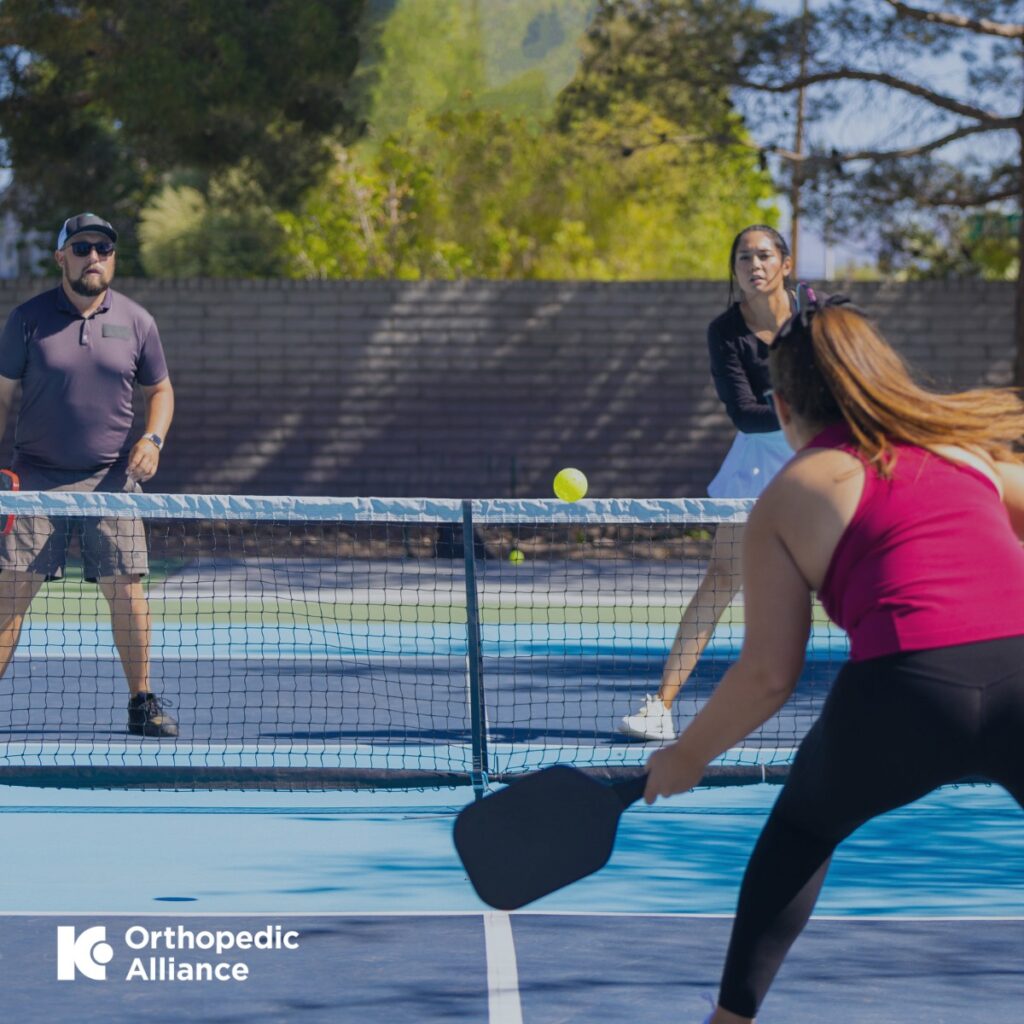
Many of us have a favorite sport, whether we play it competitively or for fun. Any athlete will tell you, injuries are a nearly unavoidable part of the game. Sport movements like running, jumping/landing, changing direction and pivoting, can all put your body at risk for an acute sprain, strain or joint injury. Performing these sport movements repetitively over years of play can lead to degenerative changes in the tissues, which we often term “wear and tear.”.
When an injury strikes or joint pain starts to take its toll, turning to an expert care team is crucial to helping you return to play. As a leader in orthopedic sports medicine in Kansas City, Kansas City Orthopedic Alliance focuses on providing the best possible care for athletes of all ages. Whether you’re dealing with an acute injury or nagging joint pain, we focus on finding unique treatment solutions to fit your needs.
Read on to learn more about our sports medicine capabilities at KCOA, including the areas we treat, what you can expect from treatment, and how our care staff works to alleviate your pain and symptoms.
Why Seek Orthopedic Sports Medicine in Kansas City?
In the event you do experience an injury, promptly seeking care is crucial to limiting the extent of the damage. This is especially true if pain and symptoms persist or become more intense. While many athletes think that playing through pain is worthwhile, the reality is that you may cause further damage to the injured tissue, delaying your recovery and slowing your return to sport.
Utilizing proven orthopedic treatments, the physicians at KCOA understand the process for diagnosing and treating the musculoskeletal conditions associated with playing sports. Our team at KCOA specializes in deploying Sports Medicine techniques to injuries that happen both on and off the court.
Some athletes may wonder why orthopedic sports medicine in Kansas City is important for their treatment. While a team athletic trainer or primary care physician can be critical components to starting the acute injury management process, orthopedic sports medicine helps fill any of the missed spaces with advanced diagnosis and treatment.
This may include using advanced diagnostics (ultrasound, MRI, etc.), performing in-clinic treatments like injections to reduce inflammation or, if necessary, surgical interventions.
What We Treat
Kansas City Orthopedic Alliance offers comprehensive treatment for a wide variety of sports-related acute injuries and joint issues. When it comes to ailments, certain sports or activities will place extra stress on different areas of the body, putting them at risk for injury.
For example, basketball players tend to be at a higher risk for knee and ankle injuries because of continuous running and jumping motions. Baseball and softball players are particularly susceptible to elbow and shoulder injuries.
Oftentimes, these injuries are not from contact, but rather a sudden motion or attempting to land, slow down or change direction. Repetitive stress on a tissue, such as pitching, can also lead to inflammation or degenerative changes to muscles, tendons and joints involved with that movement.
With that said, there’s no sport that’s exempt from a particular injury. Incidental contact, hard falls, and direct impact from a ball or puck can all cause injuries on any portion of the body. Whatever the source of your injury, experts in orthopedic sports medicine in Kansas City can help you get back in the game.
Some of the most common sports-related conditions we see include:
- Ligament sprains or tears
- Tendonopathy
- Tendon tears
- Muscle strains
- Shoulder & rotator cuff injuries
- Knee injuries
- Back injuries
- Concussion-related brain injuries
It’s important to remember not all of these injuries will require extensive treatment or invasive surgery. More minor injuries, such as sprains, may improve with active rest, inflammation control and guided stretching or strengthening by a trained therapy professional. KCOA physicians exhaust all conservative and non-invasive measures before recommending any surgical procedure.
Getting a Proper Diagnosis for sports injuries
The process starts with an initial one-on-one evaluation to learn about the specific injury area and the scope of your pain and symptoms. This initial appointment varies in length depending on your condition, particularly if you have multiple injuries or musculoskeletal issues. We’ll also review your medical history and perform a physical examination.
Based on your examination, your orthopedic physician generally performs individualized tests to properly diagnose your injury or joint condition. Some of those individualized tests include:
- Digital X-Rays
- Magnetic Resonance Imaging (MRI)
- Ultrasound
- CT Scan
- Nerve Conduction Studies/Electromyograms (EMG)
By combining the results of these tests, your report of injury and your physical examination, your provider determines the proper plan of care to address your injury. While most sports-related injuries do not require surgical intervention, it may be warranted in the event of a ligament or tendon tear, broken bone, or cartilage injury.
Conservative Treatment Plans
As mentioned above, your orthopedic sports medicine team will exhaust all conservative treatment options before recommending an invasive procedure. There are several conservative treatment options your provider may suggest as part of your treatment, including all of the following:
Rest, Ice, & Elevation
Your injury may need time to heal and require you limit your physical activity for a short period of time. Elevation reduces swelling and bruising to the area, as it prevents blood from reaching your injury. Additionally, icing a few times per day for 15-20 minutes will also help with swelling and bruising.
Orthotics
Particularly in the case of plantar fasciitis and other foot injuries, your provider may recommend a custom orthotic device and a specific pair of proper fitting shoes to help reduce stress at the injury site. We usually use orthotics in conjunction with some of the other conservative measures listed here to bring about complete relief and healing.
Physical Therapy
While rest can be effective for helping treat your affected area, joints and soft tissues can also benefit from movement. Physical therapy, as part of your orthopedic sports medicine program in Kansas City, often serves as a great complement to your treatment. Your provider may refer you to a physical or occupational therapist to help increase your body’s circulation, regain range of motion, decrease pain, and increase strength.
Immobilization
Another method sports medicine providers use for treatment is immobilization. This involves the use of casts, braces, walking boots, slings, and other measures to protect the affected area and allow it to heal. Immobilization particularly helps with the reduction of pain and swelling.
Medications
Some injuries can become extremely painful, which hinders movement and causes reduced function. One recommendation your provider can make is the use of over-the-counter NSAIDs. These are anti-inflammatory medications such as Advil or Tylenol. In some cases, your provider may recommend prescription medications. We encourage patients to engage their pharmacist to ensure safe drug interactions before starting any prescription medication regimen.
Injections
In order to help with inflammation of the affected area, your provider can also recommend an injection at the site of your disruption. When combined with exercise and other conservative, treatments these therapeutic injections can be very effective.
Regenerative Medicines
Regenerative medicines involve using the body’s natural healing factors (stem cells or platelet rich plasma, for instance) by injecting these agents into the affected area. Essentially, they use your body’s own cells to help repair and rebuild worn and damaged tissue. This treatment method is especially effective for younger patients experiencing mild or moderate injuries.
Surgical Treatment
Surgery is typically our last-resort option at KCOA, only used after exhausting all conservative treatment options. The type of surgery you need depends on the location and the severity of your injury. Many surgeries conducted are outpatient procedures lasting 1 to 2 hours, meaning that the patient is usually able to return home that same day.
Prior to your surgery, your care team gives you a set of pre-operative instructions to follow. These instructions depend on the procedure being performed and on your specific physician. The decision to move forward with surgery is one made collaboratively between the patient, your family and the physician.
After you check in for your procedure, your care team will escort you back to a pre-operative area. There we will review your records and double-check your medications. Often, preoperative consults will occur with both your anesthesiologist and physician. In most instances, an IV will be started and you’ll be transferred to the operating room for your procedure.
Patients are required to make arrangements to have a family member or friend drive them home following a procedure, for the safety of all those involved.
Recovery & Return to Your Sport
Your recovery timeline will vary greatly based on a number of factors, including your age, the severity of your injury, the procedure performed (if necessary) and how well you adhere to your recovery plan. Depending on which treatment your provider recommends, you will receive a set of specific instructions to help aid with your recovery.
The aforementioned factors will also dictate when you can return to your sport. Some injuries, like sprains or a mild concussion, can heal within a few weeks of proper treatment and recovery measures. Other injuries, such as ligament tears or fractures, may take several months of treatment and rehabilitation before you’re cleared to play.
The best way to ensure that you can return to the field or arena as soon as possible is to closely follow your specific recovery plan. Rushing back to play before you’re ready can result in further damage, or even an increased risk of injury to another area of your body. Your KCOA care team will work with you through every step of the process to ensure that you can return to play without limitations.
Learn More About Orthopedic Sports Medicine in Kansas City – Contact Kansas City Orthopedic Alliance Today!
At Kansas City Orthopedic Alliance, we’re dedicated to creating a superior patient experience for all. Regardless of the location or severity of your injury, our team will work with you to ensure the best possible outcomes.
Scheduling an appointment with one of our providers allows us to find the best treatment option for your needs. Using the highest quality technology, we can pinpoint the exact underlying issue causing your pain or discomfort.
For a thorough evaluation, call us at (913) 319-7600 or use our symptom tracker tool.


